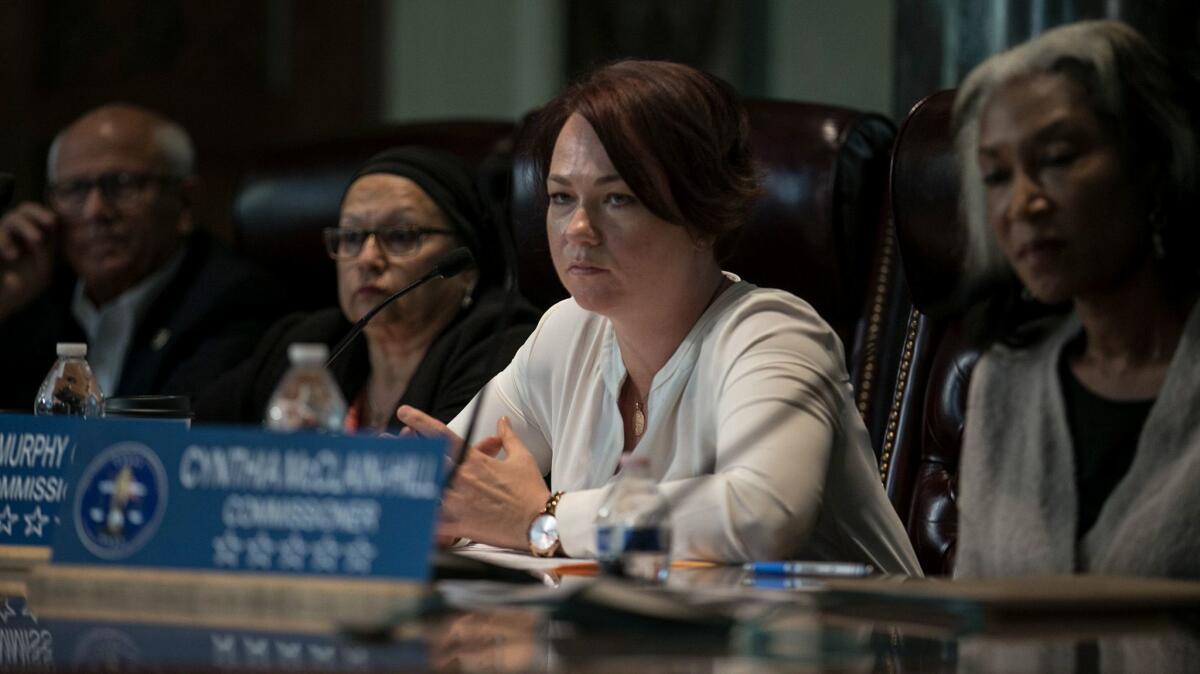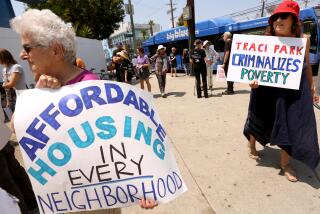At Police Commission hearing, LAPD and critics agree: policing alone isnât the answer to homelessness

The crowd that filled the chambers inside City Hall was quiet as one of L.A.âs police commissioners spoke, explaining her personal connection to one of the most pressing issues facing Los Angeles.
Shane Murphy Goldsmith said her younger brother had experienced homelessness throughout his life. She thought of him, she added, during a ride-along with some of the police officers assigned to the L.A. Police Departmentâs homeless outreach efforts.
âAs we visited encampments lining the sidewalks, I saw my baby brother behind the eyes of each person we encountered,â she said. âI owe it to him and to everyone like him to do my part to ensure that we treat each person experiencing homelessness with dignity and respect.â

L.A. Police Commission homeless hearing (Robert Gauthier / Los Angeles Times)
Goldsmithâs remarks opened a special hearing held Tuesday by the Police Commission, one focused on better understanding what people experience while living on the streets as well as the challenges that the LAPD and other agencies face trying to help them.
The four-hour meeting underscored the complexity of homelessness and how to reduce it. But gradually, a common theme emerged: Policing alone isnât the answer.
âFor decades, many peoplesâ impulse response to an unwanted homeless person in their neighborhood has been to call the police,â said Greg Spiegel, who rejoined the Inner City Law Center last year after working as Mayor Eric Garcettiâs top homelessness policy advisor. âThis hasnât worked.â
Itâs a sentiment often expressed by police officers, who feel unfairly tasked with addressing such a complicated topic, and advocates for homeless Angelenos, many of whom accuse police of using heavy-handed tactics in those communities. People who are homeless often need permanent housing or treatment for substance abuse or mental health â solutions that stretch beyond the scope of policing, they agree.
Critics accuse officers of unfairly sweeping through homeless encampments to tear down tents, seize belongings and ticket or arrest those who donât comply with city rules. The sweeps have resulted in a series of lawsuits against the city, with courts frequently siding with homeless residents and rejecting the cityâs actions to clean up sidewalks.
That criticism has flared after deadly encounters between police and homeless people, including the fatal 2015 shootings of a man living on skid row and another who was staying near the Venice boardwalk. Homeless advocates also frequently cite a mentally ill homeless man who fell to his death from a downtown rooftop in 2014 after an officer used a Taser on him.
Still, others credit police tactics with reducing crime and blight in some parts of downtown L.A. â the epicenter of the cityâs homeless population â over the last decade. Some residents and businesses say the police need to step in to make sidewalks passable and deal with drug dealing and other crimes within the homeless community.
âThereâs some groups that think we do too much â they think we do too much enforcement,â Cmdr. Todd Chamberlain, who leads the LAPDâs homeless outreach efforts, said at Tuesdayâs meeting. âAnd then on the other side, thereâs other community groups, thereâs businesses who think we do too little.â
âFor law enforcement to try to handle this social problem in an effective and a constitutional and ethical way,â he continued, âthatâs a very difficult place to be.â
As homelessness spread across the region, with tents popping up on new stretches of sidewalk and in more vegetation along the freeways, elected officials intensified their efforts to provide more housing and services. The LAPD followed suit.
The department assigned a high-ranking officer â Chamberlain â to oversee its response and expanded its Homeless Outreach and Proactive Engagement initiative, or HOPE, which pairs officers with outreach workers and sanitation employees to identify encampments and help people find permanent housing. Last summer, the Police Commission approved a new policy directing officers to treat people who are homeless with âcompassion and empathy.â
The LAPD is trying to train more officers in how to best interact with people who may be homeless or mentally ill, Chamberlain said. To understand crime affecting the homeless community, he said, the department took steps to better document those offenses and look for trends.
Since the HOPE teams were formed last year, Chamberlain said, they have contacted more than 7,500 people who are homeless, finding housing for about 390. Some arrests were made, he said â 101 for felonies and 163 for misdemeanor crimes.
Given the number of contacts, Chamberlain said he considered the numbers a âreally good balance.â The HOPE teams are designed to focus on services, he said, not enforcement.
But for some at Tuesdayâs meeting, police still act too aggressively when interacting with people who are homeless.
Spiegel said his law center, which is based on skid row, was reluctant to call the police about clients.
He pointed to one 2014 encounter, when a man named David came to the law clinic and told staff members he was afraid he might hurt himself. David called a crisis hotline, Spiegel said. Soon, two police officers showed up at the office.
When David saw the officers, Spiegel said, he grew agitated. As the staff tried to get the officers to call a mental health unit or an ambulance that would take him to a hospital, more police arrived. After a tense back-and-forth, Spiegel said, one officer reached for a Taser before a staff member intervened and an ambulance arrived.
âIt was a very close call,â Spiegel said. âThings were very close to becoming a use of force.â
General Dogon, an organizer with the Los Angeles Community Action Network, a skid row advocacy group, was one of dozens of people who attended Tuesdayâs meeting â another âsave the homelessâ meeting, he quipped. Dogon said he thought the LAPD downplayed how much of an impact enforcement has on the cityâs homeless residents.
âYouâve got all these other service providers, youâve got all these other organizations, but LAPD is the main wheel in this thing,â he said. âIf they donât stop the enforcement and stop the criminalization, then nothing is going to work.â
Goldsmith, the police commissioner, said she was impressed by the LAPDâs approach to homelessness â the policy, the training, the effort to understand what people are experiencing. But she acknowledged the difficult moments that still exist between police and homeless Angelenos, and agreed that the LAPD couldnât solve the problem alone.
The key, she said, is using additional resources to further the work of the LAPD and other agencies. Measure H, a quarter-cent sales tax increase, and Measure HHH, a $1.2-billion bond measure â both recently passed by voters to fund housing and other support â are crucial, she added. So is investment from the community.
âIt gives me hope to see a room packed full of people who want to help,â she said. âWe know things arenât perfect, but people are working so hard.â
UPDATES:
6:45 p.m.: This story was updated with additional comments and information from Tuesdayâs meeting.
10:50 a.m.: This story was updated with comments made at the meeting by Shane Murphy Goldsmith, a police commissioner, and LAPD Cmdr. Todd Chamberlain.
This story was originally published at 4 a.m.
More to Read
Sign up for Essential California
The most important California stories and recommendations in your inbox every morning.
You may occasionally receive promotional content from the Los Angeles Times.











